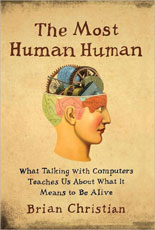Each year the Artificial Intelligence community gathers for the Loebner Prize to administer the Turing test during which the most advanced computer programs try to convince a panel of judges that they are people. Human beings also compete and that is the case of Brian Christian, who holds a dual degree from Brown University in computer science and philosophy. While preparing for this event in Brighton, England in 2009, he ponders the ancient riddle: "The human being is the only animal that _____." Most would fill in "thinks," but Christian takes a much broader and richer approach to the answer as he reflects upon human nature, computer science, philosophy, and daily life.
The Turing test attempts to discover whether computers are like us, unlike us, or better than us. What makes us special? What are we good at? What are our major gifts? Is it our eyes that make us uniquely human, our souls, or our brains? Christian explores these questions with vignettes and illustrative material from movies, science experiments, chess (the game of kings), speed dating, the art of general conversation, quantifying information, and a celebration of human curiosity. All of this input challenges us to take ourselves more seriously now that computers and robots are doing a better job imitating us. In the last chapter in the book, Christian writes:
"If there's one thing I think the human race has been guilty of for a long time — since antiquity at least — it's a kind of complacency, a kind of entitlement. This is why, for instance, I find it oddly invigorating to catch a cold, come down from my high horse of believing myself a member of evolution's crowning achievement, and get whupped for a couple of days by a single-celled organism."
